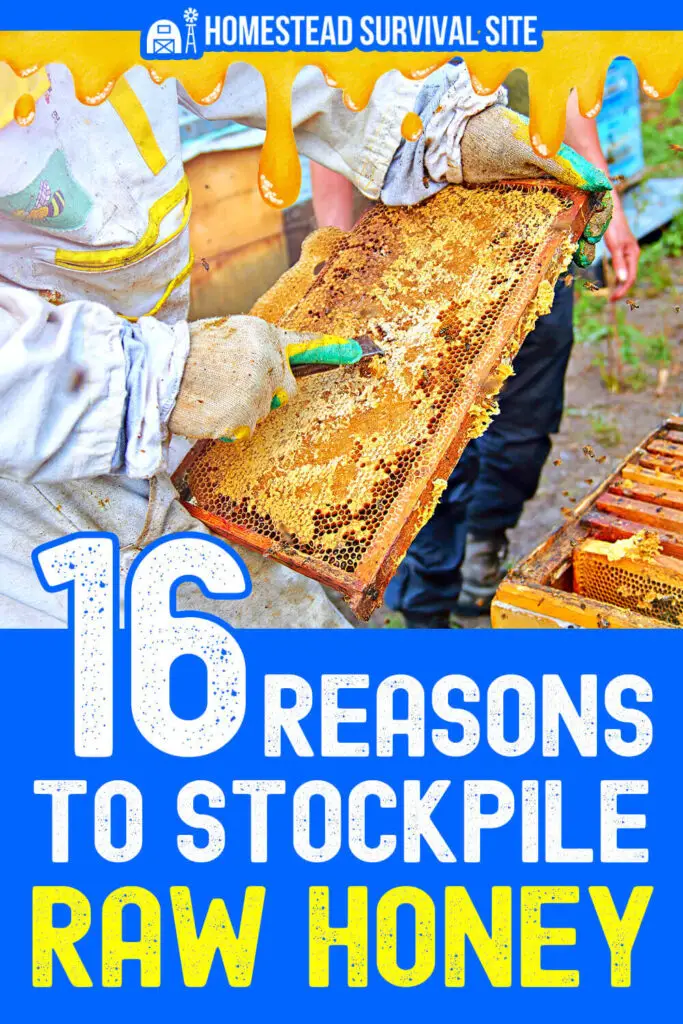Estimated reading time: 8 minutes
Disclaimer: I am not a medical doctor and nothing in this article should be taken as medical advice. Please talk to your doctor before using any of the herbs and/or remedies mentioned in this article.
What do you look for when choosing foods for your emergency pantry? Long shelf life? Easy storage? Multiple uses? You can check off all three of these requirements with raw honey.
Raw honey not only is a tasty natural sweetener, but it is anti-viral, antibacterial, and anti-fungal. It is easily one of the healthiest substances on earth. Honey also is packed with nutrition. It contains significant amounts of vitamins B1, B2, B3, B5, B6, and C; along with magnesium, iron, potassium, calcium, sodium chlorine, thiamin, and phosphate.
Under proper conditions, honey has an indefinite shelf life. In fact, honey has been discovered in good condition in Egyptian tombs that are 3,000 years old! According to National Geographic, humans have been using bee products, including honey and wax, for 9000 years or more.
In addition to its amazingly long shelf life, another advantage of having honey in your emergency pantry is that it doesn't need to be prepared or cooked to be consumed.
Want to save this post for later? Click Here to Pin It on Pinterest!
However, before you begin stockpiling this liquid gold, it is important you know that not all honey is the same. Most of the honey found in supermarkets has been filtered and pasteurized.
With pasteurization, honey is heated at high temperatures – usually around 95 degrees – in order to prevent fermentation. This process takes away any threat of botulism and makes honey more liquified and easier to use, but it destroys many of its natural benefits. Some commercial honey also contains water, sugar, and other additives.
Raw honey, on the other hand, can be described as “honey as it exists in the beehive.” It may have been strained to eliminate bits of beeswax (or even bee body parts), but it has not been overheated. Raw honey may or may not also be labeled “organic.”
According to the USDA, organic honey was made from a bee farm that follows the organic standards. This designation means that hives should be free of chemicals and the flowers that the bees visit are not sprayed with chemicals.
Raw honey is darker, thicker and opaquer in appearance than regular honey. It may contain wax or pollen particles, but its nutrition level remains intact.
Storage
For long-term storage, keep honey in airtight containers – lidded glass jars are ideal – in a cool, dry and dark place. Honey does best away from heat and sunlight and in temperatures ranging between 50- and 70-degrees Fahrenheit.
Don't be concerned if you notice crystals in stored honey. It is a normal chemical change as honey changes to its sugar state. When you are ready to use the honey, simply place the container in warm water to dissolve the crystals. You can also use honey in its crystallized form for many uses. The crystals will dissolve as you stir it into hot tea, for example.
Benefits and Uses
You already know that honey works well as a natural sweetener, but you may not realize that you can use it in many other ways. Here are 16 more reasons to stockpile honey.
1. Helps Preserve Food
The compounds in honey inhibit the growth of microorganisms that cause food to spoil. In a survival situation, this benefit may help lengthen your food supply.
2. Relieves A Cough
Honey is an ingredient in many over-the-counter cough syrups, but it works well on its own. Skip the other chemicals and try a spoonful of honey to soothe a cough or a sore throat.
Or try this recipe for homemade cough syrup.
Ingredients:
- 2 lemons, washed and thinly sliced
- 6 TB grated ginger root
- Raw honey (as desired)
Directions:
- Layer the grated ginger and the lemon slices in a glass jar until the jar is full.
- Pour the honey into the jar, moving the lemon and ginger around with the edge of a knife to make room for the honey.
- Store mixture in the refrigerator for at least two weeks before use. Then, take one to two teaspoons three times per day for a cough or sore throat relief.
3. Moisturizes Skin
As a natural humectant (something that absorbs moisture from its environment), honey can help keep skin hydrated. You can also use it to treat dry skin on the face, lips, and elbows. It also can add moisture to dry hair.
4. Treats Acne
Gentle on all skin types, honey can help heal acne scars and kill the bacteria that cause acne. You can apply a dab of honey directly to an acne spot. Leave it there for 10 minutes, rinse with warm water and pat dry.
5. Exfoliates The Face
You can use honey in a face mask to slough off dead skin while adding moisture. Here’s how. Place a small amount of honey and baking soda in your palm and rub your palms together for a few seconds. Gently apply the mixture to your face. Then massage the mixture in using gentle circular motions for about a minute. Leave the mask on for 15 to 20 minutes.
6. Lowers Risk Of Diabetes
Consumption of raw honey can help people suffering from hypoglycemia (low blood sugar).
7. Reduces Cholesterol
Honey can help lower the level of bad cholesterol and in the body, thereby, decreasing the risk of coronary artery disease.
8. Moisturizes Chapped Lips
You can make a soothing lip balm with raw honey as the main ingredient. Here is the recipe.
Ingredients:
- 1 teaspoon raw honey
- 2 teaspoons granulated white sugar
- 1/2 teaspoon Jojoba oil
- 1 drop lemon essential oil
- Lip balm container
Directions:
- Mix all ingredients together.
- Rub a pea-sized amount onto damp lips for about one minute. Rinse off and gently pat dry. Store the rest in the container and use within one month.
9. Improves Circulation
Raw honey consumption strengthens the heart and promotes better blood circulation.
10. Aids Sleep
Raw honey promotes restful sleep by promoting blood sugar stability and increasing the production of the brain chemicals serotonin and melatonin. Try stirring a tablespoon of raw honey into a glass of warm milk to drink before bed.
11. Balances The Gut
Raw honey has antibacterial properties that help keep the balance of good bacteria versus bad bacteria in check in the digestive system. Honey also helps coat the stomach lining with nutrients and enzymes that can help ease nausea.
To ease digestion issues, try mixing a teaspoon each of raw honey, lemon juice, and raw apple cider vinegar into a glass of water and sip the mixture two or three times daily.
12. Improves Allergies
Consuming one to two tablespoons of raw honey a day may help reduce the effects of seasonal allergies by introducing the pollens that cause the allergic reaction into the body.
13. Heal Wounds
A dab of raw honey can help heal mild burns, scrapes, cuts, and rashes. A 1:1 topical mixture of honey and cinnamon can help relieve mild eczema. Simply apply a thin layer of raw honey to a minor wound with a cotton swab and cover with a bandage.
14. Reduces Inflammation
Raw honey can lower levels of homocysteine, an amino acid in your blood that is linked with the early development of heart disease.
15. Cleanses And Shines Hair
Raw honey can benefit the hair and scalp. Use a 10:1 ratio of warm water and honey as a mild dandruff shampoo. Honey also works in a homemade hair mask. Mix one teaspoon of raw honey with 5 cups of warm water. Apply the mixture to your hair and let it sit for about five minutes before rinsing thoroughly.
16. Works As A Natural Energy Drink
Many commercial energy drinks contain large amounts of sugar and artificial ingredients. Drinking water mixed with raw honey provides electrolytes and enzymes, keeping you hydrated and alert.
Warning
As you can see, there are many benefits of raw honey. However, there is a potential downside, especially for babies under one year and people with compromised immune systems.
Consuming raw honey occasionally can lead to botulism, a form of food poisoning caused by bacterial spores. Eating contaminated raw honey can result in breathing problems and muscle weakness.
Locally-Sourced Honey
Visit this interactive website to find local honey producers near you. Local beekeepers can not only sell you their raw honey but also bee pollen, beeswax, royal jelly, and even a beehive if you are interested in raising your own bees.
Here are some questions to ask a honey producer before your purchase.
- What are the kinds of flowers the bees have been foraging on? This information will help you determine the flavor of the honey.
- Do you mix your honey with any additives?
- Has the honey been filtered to remove pollen?
Like this post? Don't forget to Pin It on Pinterest!
You May Also Like:













Cox’s honey. Sign up for the newsletter and they will let you know about their specials. I’m not affiliated with this company except as a customer.
I ended up discarding two large pails (5 lbs each) of honey I purchased from a Hutterite Colony. The pails fermented which changed the product drastically. I had never had that happen before. Crystals are no problem but bubbling honey that smells like beer is. The honey had been stored properly and was less than one year old. Googling uses for fermenting honey yielded mead recipes and not a lot else. So they were just tossed. Such a waste.
If it fermented, the moisture content was too high when it was packaged or the packaging allowed moisture to enter. I would go back to where you bought it and they should replace it or reimburse you.